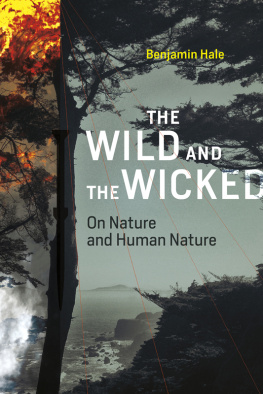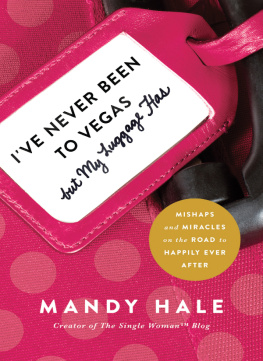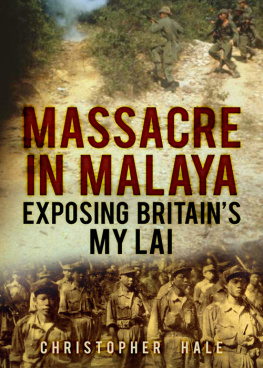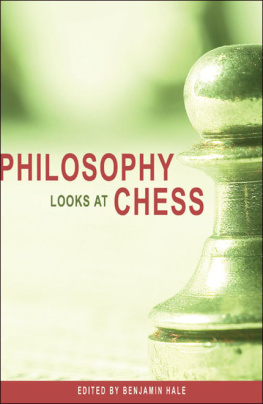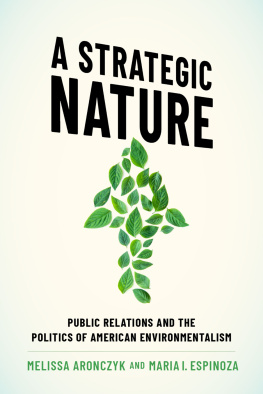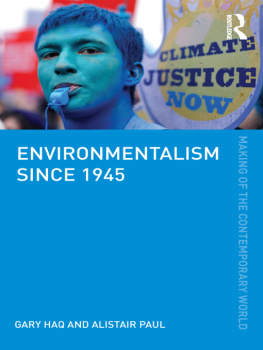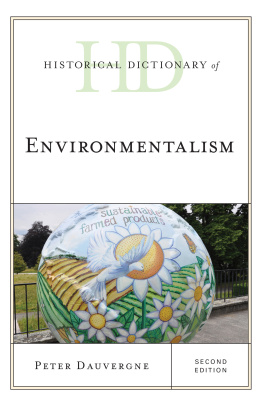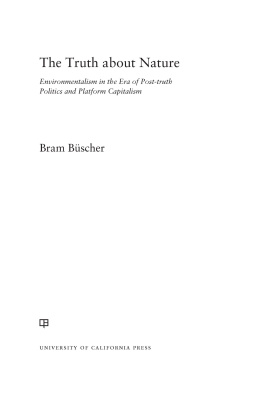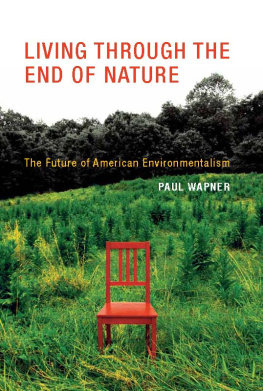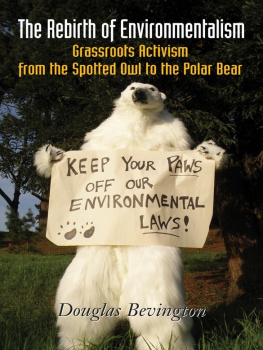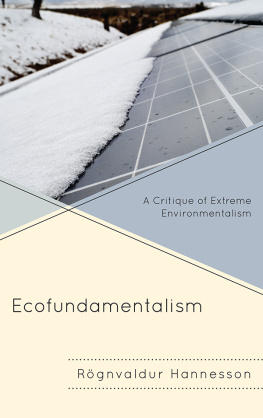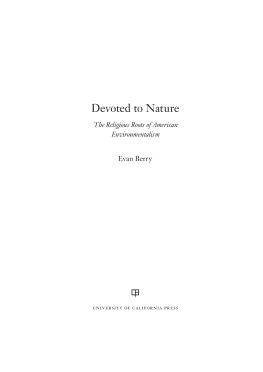The Wild and the Wicked
On Nature and Human Nature
Benjamin Hale
The MIT Press
Cambridge, Massachusetts
London, England
2016 Massachusetts Institute of Technology
All rights reserved. No part of this book may be reproduced in any form by any electronic or mechanical means (including photocopying, recording, or information storage and retrieval) without permission in writing from the publisher.
This book was set in Heron Sans and Century Schoolbook Pro by Toppan Best-set Premedia Limited. Printed on recycled paper and bound in the United States of America.
Library of Congress Cataloging-in-Publication Data
Names: Hale, Benjamin, 1972- author.
Title: The wild and the wicked : on nature and human nature / Benjamin Hale.
Description: Cambridge, MA : MIT Press, [2016] | Includes bibliographical references and index.
Identifiers: LCCN 2016018207 | ISBN 9780262035408 (hardcover : alk. paper)
eISBN 9780262336482
Subjects: LCSH: EnvironmentalismPhilosophy. | Philosophy of nature. | NatureEffect of human beings on.
Classification: LCC GE195 .H34 2016 | DDC 304.2dc23 LC record available at https://lccn.loc.gov/2016018207
ePub Version 1.0
Acknowledgments
This book is very much an experiment, an attempt to integrate the complicated technical analysis of contemporary philosophy into a manuscript that is accessible to an educated, but perhaps not philosophically informed, readership. The problem is that to merge the abstract, disinterested, and careful reflection of philosophy with the snarly, politicized, and convoluted practical considerations of our environmental quagmire has meant making more than a few sacrifices in technical specificity, taking quite a few risks with style and voice, and entertaining scenarios that otherwise dont jive with well-accepted political commitments. It has also meant suffering the slings and arrows of a referee process that is more geared toward academic precision than readability. Frankly, it has been more rigorous and demanding than any Ive experienced with other publications.
There are many, no doubt, who will take great umbrage with what Ive written here. Indeed, readers and referees of this manuscript have been of two minds: either they love it or they hate it. Some referees have taken me to the mats over the looseness of my argument. Others have criticized the glibness of my prose. Still others have bludgeoned me because they sense that the views I discuss here are politically dangerous, giving too much credence to the other side. Its easy to pick nits. For this, then, I should acknowledge my referees and my critics, but not in a thank you kind of way.
Though I have my detractors, I also have my supporters, and it is this unbelievable collection of friends and family that has kept me going through what has been one of the most trying publication efforts of my life. All of the people I have encountered and crossed paths with over the past several decades of environmental activism have influenced me immensely, and I owe each of them a shout-out for their support and effort in trying to make the world a better place. I mention them briefly in this book: Schwibby, Mookie, Oyster, Badger, Turtle, Dirt, Mad Dog, and others. Mad props to you all for your work to improve the planet.
The many who read and provided comments on early and later versions of this manuscript deserve attention as well: Roger Fortuna, Henry Pickford, Chad Kautzer, Simon Sparks, Allen Thompson, Ken Shockley, Elissa Guralnick, Brian Calvert, and actually quite a few others have been invaluable critics and supportive friends.
I should also thank some of my extremely close friends and professional colleagues. My dear friend and mentor, Andrew Light, provided for me immeasurable support and encouragement throughout this project. Ive learned a great deal from him about environmental ethics, academic politics, and climate policy. I also owe him a great debt, as I think we all do, for his tireless work helping to craft a viable international climate agreement. My Bizarro doppelgnger, Alastair Norcross, through his interminable ribbing, has galvanized for me my conviction that consequentialism cannot do the work that many believe it capable of. I suppose more than anyone, hes my imaginary interlocutor here. After all these years, I have no hope of convincing him, but Im pretty sure hes never hoped to convince me either. I should also thank another close friend and colleague, Roger Pielke Jr., who has helped me see much more clearly how foggy and confusing climate policy and climate politics can be. Hes been encouraging and helpful along this whole journey. Weve shared many beers together, and Ive always found him to be a constructive and encouraging critic.
As Ive slowly banged away at drafts of this manuscript, the team at the MIT Press has been incredibly supportive and understanding. Beth Clevenger is wise beyond her years. Her professionalism and enthusiasm made the submission and production process much less painful than it could have been.
But no acknowledgments section would be complete without attending to those who have attended to me in the kindest, most important ways. My mother, Amy Hale, for teaching me to give a shit and supporting me through the more uncertain times. Ill never forget sheepishly knocking on her bedroom door at 3:30 a.m.[tap-tap-tap], Mom?to confess my dark and painful secret: I was going to major in philosophy. My mothers partner, Jack Lynn, for his lifelong commitment to conservation and for his willingness to become my sons Gaia Father, assuming the burden of teaching him to live responsibly on this planet. My little sister, Lauren Hale, an accomplished academic in her own right, offered for me a role model of academic success. Though Im four years her elder, Ive always felt that Im playing a game of catch-up. My father also played a role in the development of this book, mostly through my imagined conversations with him about why he should vote for such-and-such a candidate.
If it is appropriate to thank the deceased, I suspect I owe no greater debt than that which I owe to my uncle, Jesse Mantel. Though he died of a glioblastoma when I was 18, he was alive long enough to instill in me a lasting interest in the deep questions. Not only was he eminently well-read, but he introduced me to thinkers I would later come to relish. His struggle with cancer, perhaps, was my first introduction to the brutality and unfairness of nature.
Above all, my wife, Becky McNeil, has helped me take this book from seedling to fruit. Not only has she read multiple versions of this manuscript and helped me cautiously navigate the publication gauntlet, shes also provided emotional and moral support all along the way. She is without question my best friend and main pillar. For at least the past ten years, weve been blessed by our son, Jasper, who has reintroduced the world to us and helped to take the edge off our cynicism. I am reminded, as I watch him grow, why we should care about our planet in the first place. It is my fervent hope that as we think more carefully about our environmental obligations we can find a way to give him some peace and stability when he has children of his own.
Introduction
Apart from the time I substituted a cup of salt for a cup of sugar, one of my first cooking misadventures occurred in the early 1990s, on a Thanksgiving trip home from college. Filled with an arsenal of ideas and a mind for social change, I was home to proselytize, eager to persuade my family that a vegetarian diet was not only the right diet but the tastiest diet as well. It was my view then that each of us is obligated to do our part to undermine the negative impacts of factory farms. Not only are such farms cruel to animals, I thought, but they are also an extremely inefficient way of providing food. I was of the mind that each American bore the burden to change his or her behavior to help put factory farms out of business. And so I took it upon myself to demonstrate that a good, healthy holiday meal neednt be propped up by honey-baked hams and richly stuffed turkeys.

